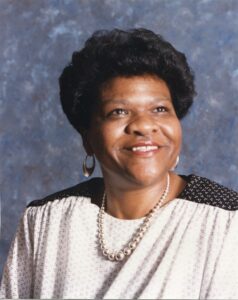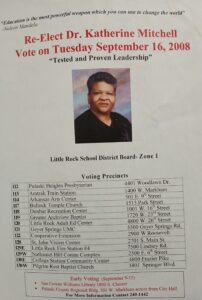calsfoundation@cals.org
One Woman’s Work: A Dive into the Vertical Files

Katherine Phillips Mitchell was born into a home of hope. Although her parents Clem Phillips and Parthenia Nash Phillips lived in the area of Little Rock known as Hanger Hill, they originally came from Hope in Hempstead County. Her siblings Clemmie, Charles, Doris, and Delois were raised with the value of hope educationally, socially, religiously, and in service to their community.
Katherine attended Little Rock Public Schools and graduated from Horace Mann Senior High School. She obtained a BA in English at Philander Smith College in 1965 and an MA from the University of Wisconsin, Madison. Her doctorate was from the University of Arkansas in Fayetteville.
Education was her focus, and adult education was her passion throughout her career. In 1986, she assumed the presidency of the Little Rock Council of the Parent Teacher Association (PTA), comprising thirty-six schools in the Little Rock School District, and was committee chairperson of the National PTA Convention held in Little Rock during her tenure. She served on various community boards, including the Pulaski County Facilities Board, Professional Counseling Associates, Pulaski County Health Agency, Board of Education of Volunteers in Public Schools (VIPS), and the Parent Center. She was president of the William E. Thrasher Boys Club Women’s Auxillary and a representative to the Little Rock Boys Club Board of Directors.
She served as president of the National Council of Negro Women (Little Rock) and was a member of the Merit System Review board, which reviewed employment-related cases of state employees. She was also associate matron of the Shamrock Chapter of Eastern Stars and a member of Heroines of Jericho and the Little Rock District’s Bi-Racial Committee.
She served as Arkansas coordinator for the Hal Jackson Talented Teens Pageant and was a volunteer for the Internal Revenue Service VITA program, providing free tax service in the community.
She served as a board member and secretary of Independent Consultants, Inc.; was a lay therapist for SCAN (Suspected Child Abuse and Neglect); was on the Ouachita Girl Scout Board; and was a volunteer probation officer in Pulaski County. She organized tutorial programs at Kramer Elementary School, Thrasher Boys Club, and Fayetteville Public Schools and was president of Delta Sigma Theta Sorority, Inc., Little Rock Graduate Chapter.
With a lifetime membership at Ward Chapel African Methodist Episcopal Church, she held leadership positions on the local and district levels. Her professional organizations included the Alumni Chapter of Alpha Kappa Mu Society, Phi Delta Kappa, American Association of University Women, National Council of English Teachers, and the International Reading Association.
She supervised a program for first-generation college students funded by a grant to the city of Little Rock from a pilot program of the Jimmy Carter administration. The Career Advancement Voucher Demonstration Project provided assistance to 100 students to attend college across the state. (The program was ended by the Reagan administration after two years.) More than seventy-five percent of the original students obtained degrees in higher education and became productive members of their communities. She also became the access coordinator for Storer Cable Communication’s Black Access Channel 14, developing opportunity and training for programming focused on minority communities, and was elected to the Little Rock School District Board of Directors.

She was unanimously elected the first woman president of Shorter College in North Little Rock in 1989. The school regained accreditation through her leadership and built a child development center on campus. She successfully introduced a summer tutorial program for elementary-aged youth during her tenure and continued serving the educational community at Philander Smith College and the University of Arkansas at Pine Bluff after leaving Shorter College.
All of her efforts exemplified hope and a nurturing of the possibilities she saw, as well as her love for her son, Jeffrey A. Mitchell.
Information gathered from the African American resources found in the vertical files in the Research Room on the second floor of the CALS Bobby L. Roberts Library of Arkansas History & Art. Visiting info. here.
***
The vertical files, formerly known as the newspaper clippings files, have existed since the beginning of the Central Arkansas Library System in 1910. They hold a collection of articles and other writings from newspapers, magazines, community programs, etc., highlighting people, places, and events.

The two main categories of people and subjects have smaller divisions like cities and towns, music, transportation, African American, artists, and authors. Most of the files contain newspaper clippings, but there are also other printed materials such as magazine articles, pamphlets, and brochures. The files are a good place to start a research project. Research desk staff at the Roberts Library can tell you if a subject you are interested in is represented in the collection, and the subjects are also indexed and available here: https://robertslibrary.org/vertical-file/
By Rhonda Stewart, genealogy and local history specialist for the Central Arkansas Library System’s Butler Center for Arkansas Studies, housed in the CALS Bobby L. Roberts Library of Arkansas History & Art




